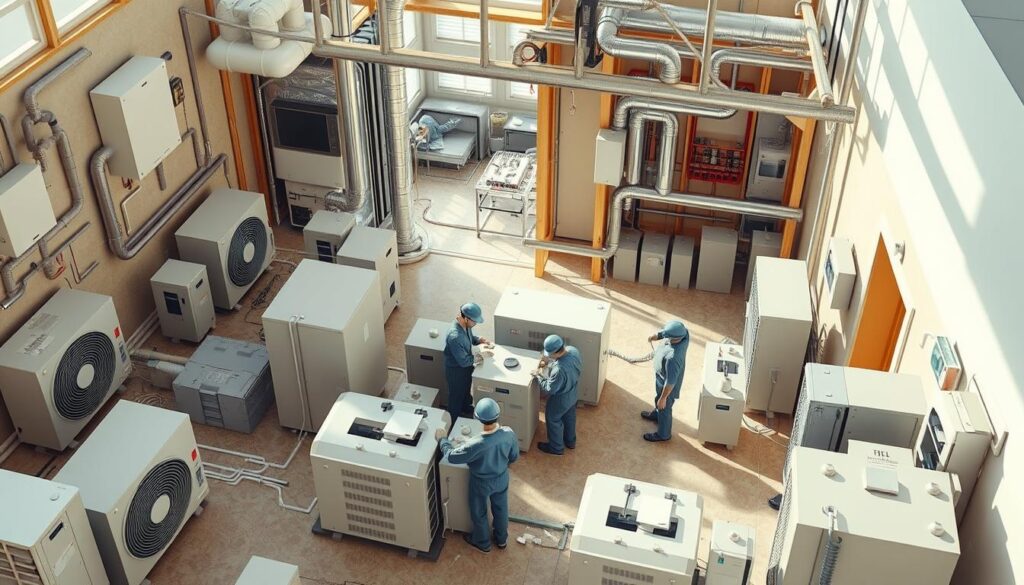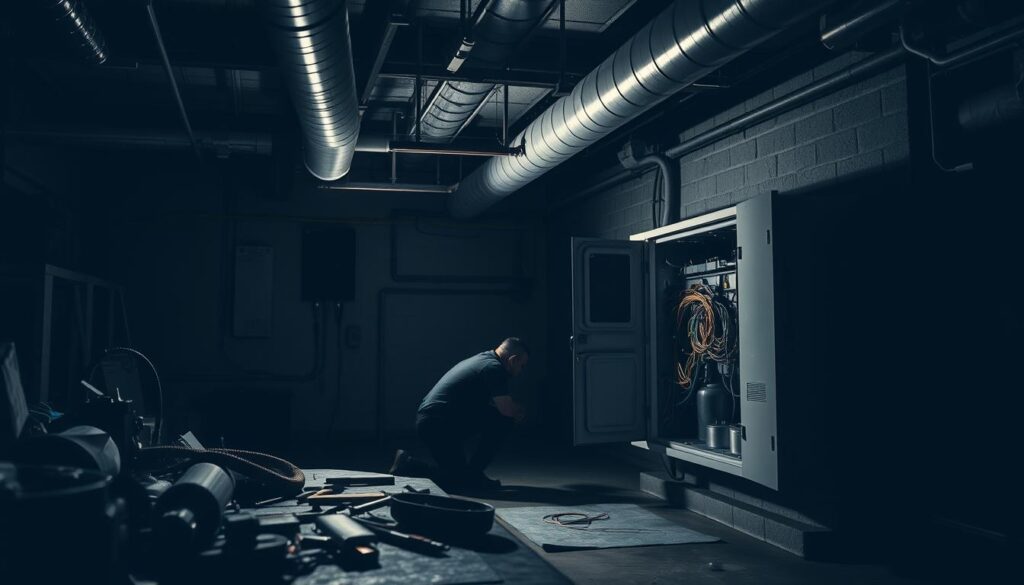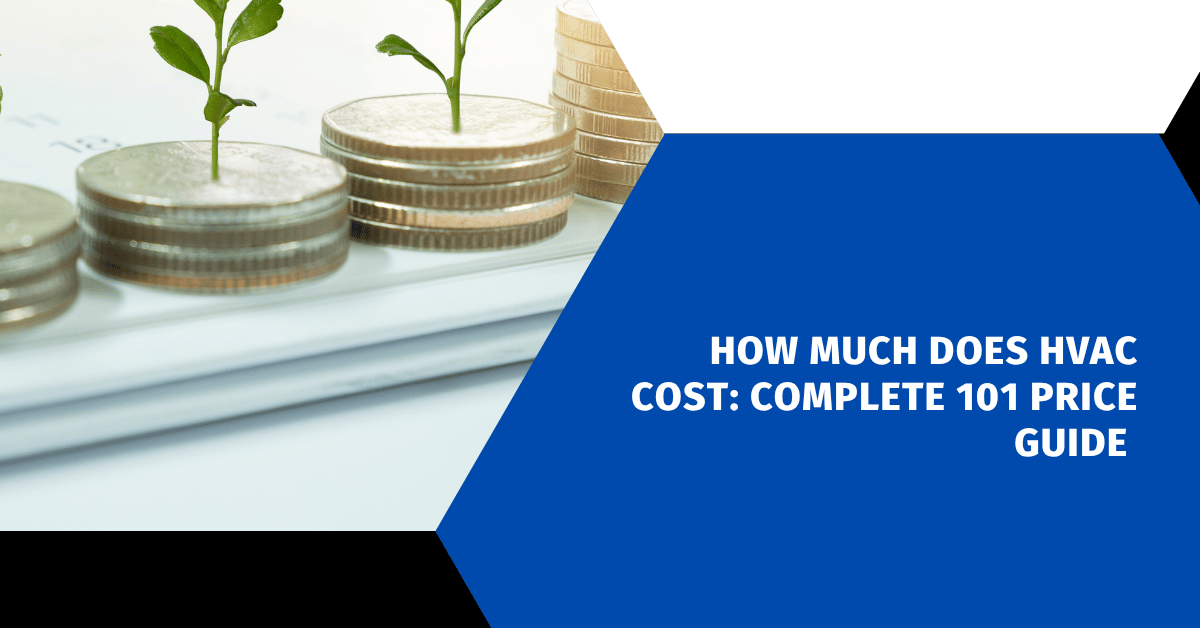Affiliate Disclosure
HVAC Guide Guys is a participant in the Amazon Services LLC Associates Program, an affiliate advertising program designed to provide a means for sites to earn advertising fees by advertising and linking to Amazon.
How Much Does HVAC Cost? Are you curious about the cost of a new HVAC system this year? The price to heat and cool your home might be higher than you think.

HVAC installation costs can vary a lot. Homeowners usually spend between $5,000 and $12,500 in 2024. To understand these costs, you need to look at several factors.
This guide will help you understand HVAC costs. We’ll cover installation, replacement, and maintenance costs. Whether you’re upgrading or looking for options, you’ll get the information you need to make a smart choice.
Key Takeaways
- Average HVAC replacement costs range from $5,000 to $12,500
- Multiple factors impact overall HVAC installation costs
- System efficiency can significantly influence long-term expenses
- Professional assessment is key for accurate pricing
- Energy-efficient models may offer substantial savings
Table of Contents
Understanding HVAC System Basics and Costs Overview
Exploring HVAC system pricing can be confusing. Your home’s comfort depends on the right heating, ventilation, and air conditioning system. Knowing the basics of HVAC system pricing helps you make a good choice.
Today, homeowners have many HVAC system options. Each has its own features and prices. Let’s look at the most common types:
- Central Air Conditioning Systems: Great for cooling your whole home
- Furnace Systems: Reliable for heating homes of all sizes
- Heat Pumps: Work for both heating and cooling
- Ductless Mini-Split Systems: Ideal for precise temperature control
Average Cost Ranges for Different Systems
Here are the typical price ranges for HVAC units:
- Air Conditioner (3-ton unit): $4,000 – $8,000
- Furnace (80% efficiency): $4,000 – $6,000
- Heat Pump (3-ton, 14 SEER): $5,000 – $10,000
Factors Affecting Initial Investment
Several factors influence the cost of your HVAC system:
- System size and capacity
- Energy efficiency ratings
- Brand reputation
- Installation complexity
- Local market conditions
“Investing in the right HVAC system is not just about upfront costs, but long-term comfort and energy savings.” – HVAC Industry Expert
Understanding these basics helps you choose wisely for your home’s comfort system.
How Much Does HVAC Cost in 2024: Current Market Prices
Knowing the cost of HVAC systems is key for homeowners looking to upgrade or install in 2024. The market offers a wide range of prices, influenced by several factors.
HVAC costs vary a lot. This depends on the system type, home size, and where you live. Here are some price ranges for homeowners:
- Central Air Conditioning: $3,500 – $7,500
- Heat Pump Systems: $4,000 – $8,000
- Furnace Installations: $2,500 – $6,000
- Ductless Mini-Split Systems: $2,000 – $5,500
Professional installation can cost between $50 to $100 per hour. Your total cost will depend on a few important things:
| Factor | Price Impact |
|---|---|
| Home Square Footage | Directly increases system and installation costs |
| System Efficiency Rating | Higher SEER ratings increase upfront expenses |
| Local Labor Rates | Varies by region and contractor expertise |
When planning your HVAC project, remember. Quality equipment means saving money on energy and better comfort in the long run.
Explore Our HVAC Shop
Looking for top-rated HVAC tools, parts, and accessories? Visit our shop and find the perfect solution for your needs.
Visit the ShopComplete Cost Breakdown for HVAC Installation
Knowing the full cost of HVAC installation is key for homeowners looking to upgrade. It helps you plan your budget and make smart choices about your heating and cooling.
When you look at the cost of HVAC for your home, you’ll find three main areas to spend money on.
Equipment Expenses
The biggest part of the cost is the equipment. This includes:
- Central air conditioning units
- Furnace or heat pump systems
- Matching indoor and outdoor parts
- Special cooling and heating tech
Labor and Installation Fees
Getting your HVAC installed right needs skilled workers. The cost of labor depends on:
- Local wages
- How complex the job is
- The size and type of system
- Any special challenges with your home’s layout
Additional Components and Materials
There are also extra costs to consider:
| Component | Estimated Cost Range |
|---|---|
| Ductwork Changes | $500 – $3,000 |
| Upgrades to the electrical system | $300 – $1,500 |
| Installing a new thermostat | $150 – $500 |
| Refrigerant lines | $200 – $700 |
Pro tip: Always get quotes from different companies. This way, you can understand each cost part better and make a wise choice for your HVAC project.
HVAC System Size and Capacity Pricing
Choosing the right HVAC system size is key for your home’s comfort and energy use. The cost of HVAC systems changes a lot based on their capacity, measured in tons. Knowing these differences helps you choose the best HVAC unit for your home.
The size of your HVAC system affects its performance and cost. You must think about your home’s size when looking at HVAC prices. A system that’s too small won’t cool or heat your home well. On the other hand, a system that’s too big wastes energy and raises your utility bills.
- Small homes (1.5 to 2 tons): Ideal for spaces under 1,000 square feet
- Medium homes (2.5 to 3.5 tons): Perfect for 1,000-1,500 square foot spaces
- Large homes (4 to 5 tons): Suitable for homes over 1,500 square feet
Here’s a breakdown of hvac system pricing by capacity:
| System Size | Home Size | Price Range |
|---|---|---|
| 1.5 – 2 tons | Up to 1,000 sq ft | $3,500 – $5,500 |
| 2.5 – 3.5 tons | 1,000 – 1,500 sq ft | $4,500 – $7,500 |
| 4 – 5 tons | Over 1,500 sq ft | $6,500 – $12,000 |
Pro tip: Always talk to a professional HVAC technician to find the right size for your home. They can do a detailed calculation to make sure your system works well and saves energy.
Explore Our HVAC Shop
Looking for top-rated HVAC tools, parts, and accessories? Visit our shop and find the perfect solution for your needs.
Visit the ShopEnergy Efficiency Ratings and Their Impact on Cost
Understanding energy efficiency ratings is key when looking at energy-efficient HVAC prices. These ratings affect your HVAC costs and long-term savings. Picking the right system balances upfront costs with future energy savings.
Energy efficiency ratings give you important insights into your HVAC system’s performance. They help you make smart choices about energy savings and system investments.
SEER Ratings Explained
Seasonal Energy Efficiency Ratio (SEER) measures cooling system efficiency. Key points include:
- Minimum SEER rating of 14 required in Northern states
- 15 SEER rating mandated in Southeast and South regions
- Higher SEER ratings indicate better energy performance
AFUE Ratings for Heating Systems
Annual Fuel Utilization Efficiency (AFUE) shows heating system performance:
- Mid-efficiency systems: 80-83% AFUE rating
- High-efficiency heating systems: 90-98.5% AFUE
- Higher percentages mean more efficient heat generation
Energy Star Certification Benefits
Energy Star certified HVAC systems offer big advantages:
- Potential rebates and tax incentives
- Reduced energy consumption
- Lower utility bills
- Environmentally friendly technology
Buying an energy-efficient HVAC system might cost more at first. But, it can save you a lot of money over time by cutting down on energy bills.
Installation Complexity and Location Factors

Your home’s unique features and location can greatly affect HVAC costs. Understanding these factors is key to planning your budget for a new system.
Home layouts and structural issues can make installation harder. Older homes or those with special designs might need more work. This can raise the cost of installation.
- Home age and structural complexity
- Accessibility of installation spaces
- Regional labor market rates
- Local building code requirements
Where you live also matters a lot. Cities usually have higher labor costs than rural areas. This can add 15-25% to your HVAC costs.
| Location Type | Average Labor Cost Impact | Installation Complexity |
|---|---|---|
| Urban Metropolitan Areas | +20-25% | High |
| Suburban Regions | +10-15% | Medium |
| Rural Areas | +5-10% | Low |
Before installing your HVAC, get a professional to check your home. This can help you spot any issues and plan your budget better.
Explore Our HVAC Shop
Looking for top-rated HVAC tools, parts, and accessories? Visit our shop and find the perfect solution for your needs.
Visit the ShopBrand Comparison and Price Differences
Choosing the right HVAC brand is key to your hvac unit prices and overall costs. Not all brands are the same. Knowing the difference between high-end and budget options helps you make a wise choice.
Premium vs. Budget Manufacturers
Looking at hvac equipment costs, you’ll see many prices. High-end brands offer:
- Higher quality components
- Advanced technology integration
- Better energy efficiency
- More reliable performance
Budget brands might seem cheaper at first, but they often don’t last as long. Choosing a well-known brand can save you money and trouble later on.
Warranty Coverage Options
Warranty protection is important when picking an HVAC system. Top brands usually give:
- Standard manufacturer warranties (5-10 years)
- Extended warranty options
- Comprehensive parts and labor coverage
- Registration incentives for extra protection
Brands like Carrier, Trane, and Lennox are at the top. They offer strong warranties and top-notch systems. Their prices might be higher, but the long-term benefits and reliability are worth it.
Pro tip: Always compare warranty terms carefully and consider the total cost of ownership, not just the initial price tag.
Seasonal Pricing Variations and Best Time to Buy
Knowing when to buy HVAC systems can save you a lot of money. The right time to buy can lower your costs. This is because prices change with the seasons.
Homeowners can find great deals at certain times of the year. The best times to buy HVAC systems are:
- Late fall and early winter for heating systems
- Early spring for air conditioning units
- Off-peak months when demand is lowest
Manufacturers and contractors give big discounts in slow seasons. For example, buying a central air conditioner in winter can save you a lot. This is because prices are higher in summer.
Here are some tips to save on HVAC costs:
- Install systems during off-peak seasons
- Look for manufacturer rebates
- Compare different contractor quotes
- Choose energy-efficient models for tax credits
Buying at the right time can save you 10-20% on costs. Keep an eye on local trends and talk to HVAC experts to save more.
Explore Our HVAC Shop
Looking for top-rated HVAC tools, parts, and accessories? Visit our shop and find the perfect solution for your needs.
Visit the ShopHidden Costs and Additional Expenses
When planning for HVAC costs, homeowners often miss important expenses. These can greatly affect the total cost of installation. Knowing about these hidden charges helps you budget better and avoid surprises.

Installing an HVAC system is more than buying equipment. Several extra costs can pop up, increasing your total investment.
Ductwork Modifications
Your new HVAC system might need updated ductwork. This could be small repairs or a full replacement.
- Minor ductwork repairs: $300 – $600
- Full ductwork replacement: $2,000 – $6,000
- Sealing and insulation improvements
- Duct redesign for optimal airflow
Electrical System Updates
Modern HVAC systems need big electrical upgrades to work well.
- Electrical panel upgrades: $500 – $2,000
- New circuit installations: $200 – $500
- Wiring modifications
- Compatibility assessments
Permit and Inspection Requirements
Local laws require permits and inspections for HVAC installs. These costs vary but are essential for legal reasons.
Pro tip: Always check with local authorities about specific permit requirements to avoid fines or delays.
Anticipating these costs helps you budget better for your HVAC project. This way, you can have a smooth installation process.
Cost-Saving Strategies for HVAC Installation
It can be tough to cut down on HVAC costs, but smart homeowners find ways. Knowing about energy-efficient HVAC pricing helps you make choices that save money and keep you comfortable.
Timing is key when it comes to HVAC installation costs. Here are some smart strategies:
- Schedule installation during off-peak seasons (fall or spring)
- Research manufacturer rebates and promotional offers
- Investigate federal and state energy efficiency tax credits
- Compare multiple professional quotes
When looking at energy-efficient HVAC pricing, think about long-term savings. High-efficiency systems might cost more upfront but save you money on energy bills.
Here are more ways to save on HVAC costs:
- Explore financing options with low-interest rates
- Check for utility company incentive programs
- Consider energy-efficient models with longer warranties
- Negotiate installation packages
Pro tip: Investing in a high-efficiency HVAC system can save you up to 20% on annual energy costs.
By planning ahead, HVAC installation becomes a wise investment in your home’s comfort and value.
Explore Our HVAC Shop
Looking for top-rated HVAC tools, parts, and accessories? Visit our shop and find the perfect solution for your needs.
Visit the ShopReturn on Investment and Long-Term Value
Buying an energy-efficient HVAC system is more than just the upfront cost. It offers long-term financial gains. Understanding the full value of your investment is key.
When looking at the cost of your HVAC system, consider these important financial points:
- Energy savings
- System lifespan
- Maintenance costs
- How it boosts your home’s value
Calculating Energy Savings
Today’s energy-efficient HVAC systems save you money over time. They can cut your yearly energy bills by 20-40%. This depends on your home and local weather.
“Investing in high-efficiency HVAC is not an expense, but a strategic financial decision.” – Energy Efficiency Expert
Impact on Property Value
A high-quality HVAC system can make your home more valuable. Buyers see the worth of an efficient, well-kept heating and cooling system. This can lead to a big return when you sell.
Important factors for property value include:
- Energy Star certified systems make your home more appealing
- Recent HVAC upgrades can raise your home’s value by 5-10%
- New systems show your property is well-maintained
Pro tip: Keep maintenance records to show your system’s quality and efficiency to buyers.
Conclusion
Understanding the costs of HVAC is key. It’s not just about the price of the equipment. It also includes how efficient it is, how much energy it saves, and how comfortable your home will be.
Choosing the right heating and cooling system is important. You need to think about what you need, how much you can spend, and the benefits you’ll get in the future. Every part, from the equipment to how hard it is to install, affects the cost. Looking at energy ratings, the brand’s reputation, and how much you’ll save on energy helps you make a smart choice.
Your HVAC system is a big investment in your home. Planning carefully, doing your research, and knowing the costs can help you make the right choice. Remember, the cheapest option might not be the best in the long run. Choose quality, efficiency, and professional installation for the best comfort and value.
With the knowledge from this guide, you’re ready to make a smart HVAC investment. Take your time to figure out what you need, talk to professional installers, and choose what’s best for your home and budget.

